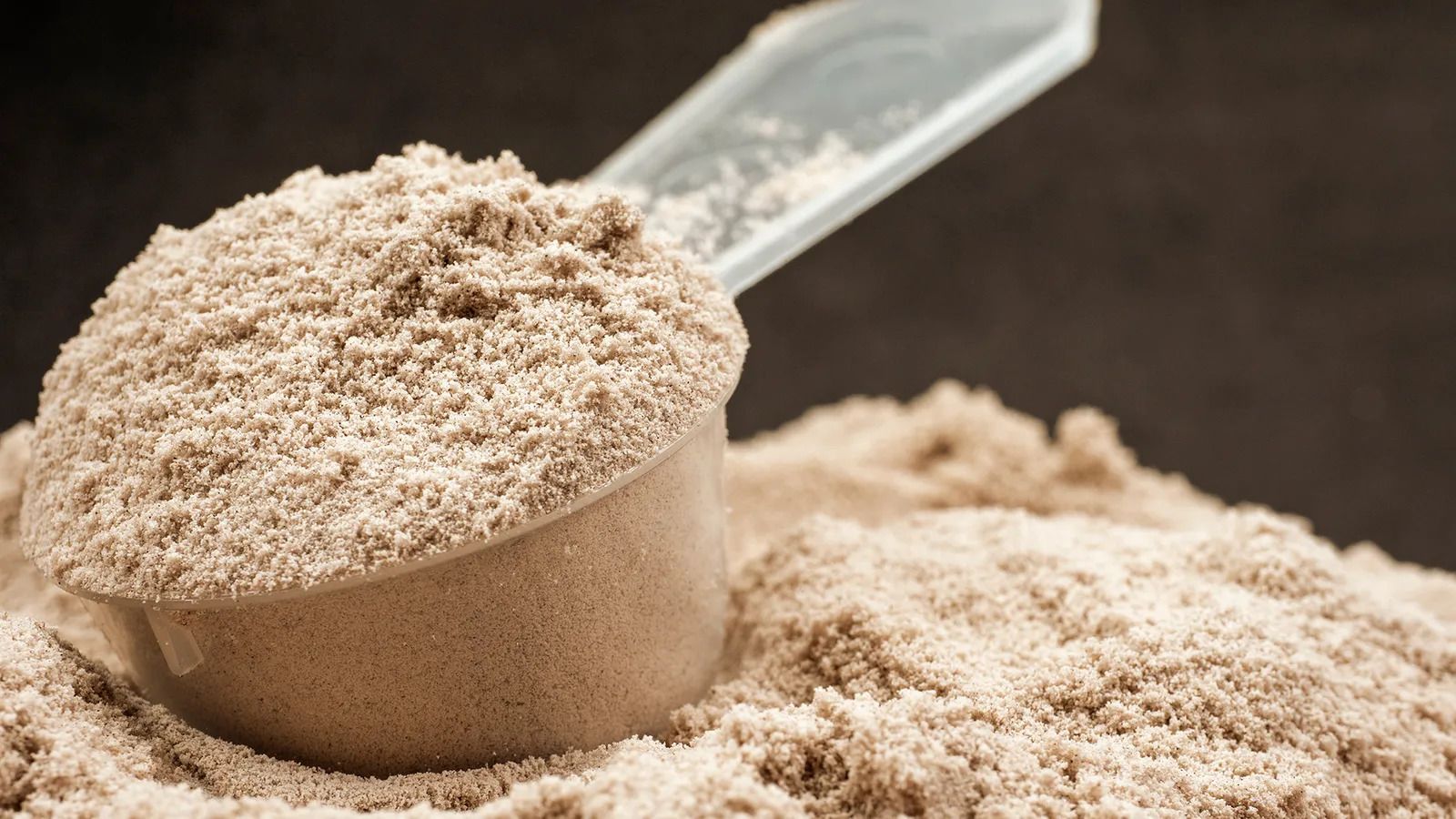
Protein powders: Are they bad for your health?
When I go into my local health food store, there’s one corner that's always been a bit of a mystery to me – the shelves packed with dozens of white plastic tubs filled with powdered protein supplements. In the changing room at the gym, however, there are plenty who sing their praises, explaining that they simply add a scoop of powder to milk or to a smoothie, work out and then build extra muscle.
With their popularity reaching way beyond bodybuilders and professional athletes, now seems like a good time to look at the evidence around protein powders.
Some people use a protein drink as a snack between meals or even use it instead of a meal if they've not got time to eat. People eating a vegan diet sometimes use the supplements to up their protein intake if they feel they're not getting enough. And there are hundreds of new food products in supermarkets – from cereal bars to ice cream and chocolate – which signal their protein-containing credentials in bold letters.
There's a range of strengths available, with the highest doses aimed at bodybuilders. The powder might come from an animal source such as eggs or milk, or from plants. For example, protein from peas, potatoes, rice and soybeans can all be extracted and powdered, sometimes with added flavourings to make them taste good.
Protein is big business. But how many of us really need any extra?
There’s no doubt that protein is an essential part of the diet. We need it to build and repair muscles, to help our bones stay strong, to maintain the immune system and to keep our brains, hearts and skin doing what we need them do.
Foods such as eggs, milk, yoghurt, fish, lentils, meat, soya, nuts and seeds are all rich in protein and the majority of adults in high-income countries do get at least the daily amount of protein recommended by health authorities.
In a meta-analysis of 49 studies, the average protein intake from people's diets at the start of the research was more than 75% greater than the US and Canadian recommendations, for example. There are some scientists in the field such as Stuart Phillips from McMaster University in Canada who argue that the recommended levels might not be high enough for everyone.
One of the difficulties is knowing how much you as an individual might need. The answer depends on your age, health and exercise routine, so the standard recommendation may not apply to you. Some older people, for example, find they don't have much appetite which can lead them to eat so little that they don't get enough protein from their diet. And if you're a professional endurance athlete you more need more protein than the average adult.
 Consuming protein powder won't actually build muscle unless you combine it with resistance exercise, studies show
Consuming protein powder won't actually build muscle unless you combine it with resistance exercise, studies show
Since we know that protein from diet builds muscle, keeps bones strong and protects your immune system, is it a case of the more the better? Could all of us benefit from a little more? Or are there risks in adding extra protein in this way?
Luckily there have been some trials than can guide us. For the most part they tend to show that protein powders can indeed help to build muscle, as many claim. But the catch is that this only works if you also do some form of resistance exercise, such as using weight machines. If the muscles aren’t exercised, the extra protein won't do anything.
In one meta-analysis from 2014, researchers combined the data from 14 randomised controlled trials where, for example, half the people consumed powdered whey protein, which is made from the liquid left over when milk is made into cheese, and half had a placebo drink. They found that as long as people also did resistance exercise, then consuming protein powders did increase their lean body mass, but if they simply drank the drinks without exercise there was no statistically significant increase.
One of the difficulties in trying to compare studies is that some are conducted with people who are obese, others with older people, and still others with younger gym-goers, which makes it hard to generalise.
Someone consuming extra protein and exercising two or three times a week will see a minimal benefit while those working out four or five times a week might see a small benefit
A more recent paper bringing together the best studies, published in 2022, focuses on trials done with healthy adults who were not overweight. Once again protein powder did make a difference, with gains in both lean body mass and in lower body strength, provided people were also doing resistance exercise. There was also a slight effect on people's ability to do bench presses, but it didn't make a difference in other tests of strength, such as handgrip. So it's not some magic powder which will suddenly make you strong. You have to put the work in.
Even after examining all these studies, the authors say the optimal amount of protein still isn't clear, although it was interesting to see that people over the age of 65 didn't need to consume quite as much powder to make a difference.
 Extra protein may only be of use if you are exercising four or five times a week
Extra protein may only be of use if you are exercising four or five times a week
One of the authors of this review, Stuart Phillips, has spent two decades studying the impact of our diets on our muscles. Speaking on the BBC's Food Programme last year, he summed it up like this: someone consuming extra protein and exercising two or three times a week will see a minimal benefit while those working out four or five times a week might see a small benefit. So unless you're very dedicated, a professional athlete perhaps, it's unlikely to make that much difference.
For those who still want to go down the supplement route even for a very small benefit, there's often talk of when it's best to take it – before you head to the gym, or afterwards while your muscles are recovering. There's also debate on which kind to take. Some swear by whey protein, other by plant sources. In the 2018 meta-analysis I mentioned above featuring 49 studies, the overall conclusion was that neither the timing nor the type of protein really mattered.
Of course if you do want to consume protein powders you also need to be sure they aren't doing you any harm. The ingredients vary between different products. As well as protein some powders contain added sugars, flavouring and vitamins. High amounts of sugar could lead to spikes in blood sugar and also, of course, weight gain.
We don't know what the long-term impact might be of adding large quantities of protein powders to your diet on a daily basis
Even more concerning are the stories online about fit young people having heart attacks at the gym and talk of whether protein powders might have contributed. With individual cases like these it's difficult to know what underlying heart problems the people affected might have had. So we need to turn to research once again.
Alas, research on this is sparse. In fact, you have to look to mice studies to find out much at all, and even then there's very little. But there was a study conducted in mice in 2020 published in the journal Nature Metabolism from researchers at Washington University School of Medicine in St Louis in the US. The researchers fed mice a high-fat diet to deliberately induce the build-up of plaque in their arteries. But half of the mice were also fed three times as much protein as the other half were given. The high-fat, high-protein group did not gain as much weight, but worryingly they had 30% more plaque in their arteries.
 Older people don't need to eat as much protein as was previously thought, recent studies suggest
Older people don't need to eat as much protein as was previously thought, recent studies suggest
The problem is that it's hard to generalise from mice on a high-fat diet taking in large amount of protein to young human gym-goers adding a scoop of powder to a drink. So it's early days for this kind of research. But it is true, of course, that we don't know what the long-term impact might be for the heart or the kidneys or any other part of the body of adding large quantities of protein powders to your diet on a daily basis.
Some argue it could bring health benefits quite separate from the muscle gain. A meta-analysis of nine randomised controlled trials found the people given protein powders lost more weight and saw an improvement in blood pressure and cholesterol levels. But the people in this study were overweight or obese, so we don't know if the same beneficial impacts would be seen in those of a healthier weight.
Dieticians are often keen to emphasise that ideally we look to our food to get everything we need before turning to supplements
At Reading University, Agnes Fekete found – in an admittedly small study with just 27 people – that if their blood pressure was just a little on the high side, then extra whey protein could lower it. Meanwhile, a new paper combining the results of 31 trials found that if people took whey or soy powder there was a reduction in two markers of inflammation in the body.
This is interesting because there are high levels of inflammation in people whose muscles become particularly weak in old age, which raises the question of whether there might be some way of trying to prevent this using protein powders.
But to really know whether there are health benefits beyond the small effect on muscle mass provided it's accompanied by exercise, we need more trials conducted over longer timespans.
Time will tell, but eventually we'll discover whether it's the fit gym-goers or the older people with small appetites who stand to gain from consuming protein powders. Dieticians are often keen to emphasise that ideally we look to our food to get everything we need before turning to supplements. Intact food seems to be the best for us, and yet we still don't know exactly why.










